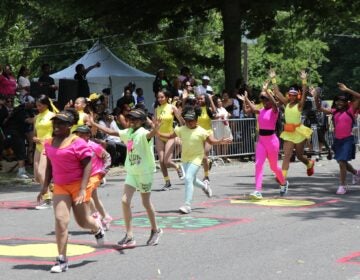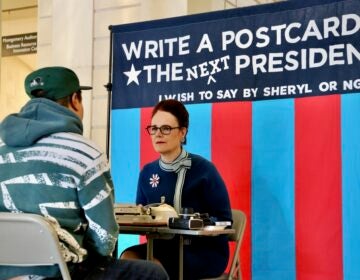At Juneteenth summit, White House spells out Biden’s record on housing, economy and education
The administration points to health care, housing and education as areas that have benefitted Black Americans during President Joe Biden’s term.
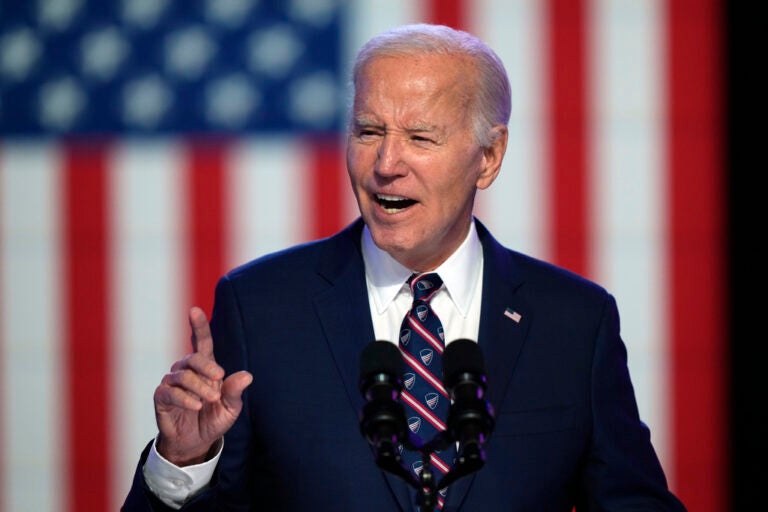
President Joe Biden speaks in Blue Bell, Pa., Friday, Jan. 5, 2024. (AP Photo/Matt Rourke)
From Philly and the Pa. suburbs to South Jersey and Delaware, what would you like WHYY News to cover? Let us know!
The White House held a Juneteenth event earlier this month, offering WHYY News the opportunity to speak with several White House officials about their priorities for Black Americans.
It’s a tall order for an administration that is losing favorability among a demographic that has traditionally favored Democrats. Despite losing support among Black voters, the White House is adamant that the lives of Black Americans have improved during President Joe Biden’s first term.
Here’s what the Biden administration highlighted:
The economy and taxes
Nearly 1 in 5 Black Pennsylvanians was unemployed as 2020 ended, according to a report published by the Economic Policy Institute (EPI). At the time, that was the highest rate of unemployment for Black workers in any U.S. state. However, by the end of the 2023, Black unemployment in the Keystone State had dropped to 5.7%, a record low and below the national average of 6.1%.
“At a very high level, I think this president is incredibly proud of his economic record and what it has meant for black Americans in particular,” Daniel Hornung, deputy director of the National Economic Council, told reporters at the White House. “We know that more than two and a half million more African Americans have jobs now than when he came into office . If you look at some stats on household wellbeing, things like wealth among Black Americans is up 60% compared to 2019 after accounting for inflation.”
The income gap between Black households and the overall average has also narrowed, with the average state unemployment in 2023 calculated at 4.2% and ending the year around 3.6%.
Hornung also said that should the president be reelected, he plans to implement a tax system that is more fair when the Trump-era tax system ends next year.
“This president has been clear that, for folks making below $400,000, their taxes will not go up, but he’s going to raise taxes on the wealthiest Americans and on large corporations,” Hornung said, adding that the administration would extend tax relief for the middle class to provide further tax relief for workers and families in the form of things like the enhanced child tax credit and the earned income tax credit.
Housing
The White House is also touting new statistics when it comes to Black homeownership nationwide.
In Philadelphia, Black residents make up the largest residential group, yet earn roughly half of white non-Hispanic households.
As the price of homes skyrocket and interest rates steadily increase, Adrianne Todman, Acting Secretary of the U.S. Department of Housing and Urban Development, agrees that Black residents have been hit the hardest.
“It’s something that this administration walked into, in addition to trying to figure out how to keep families in their home who were impacted by the pandemic and some of the folks who lost their income,” said Todman, who claims the administration has increased the number of homes bought by Black residents. “Notwithstanding those housing conditions, we have been able to help a quarter of a million African Americans purchase their home, and we’re proud of that,” she said.
Home sales in Philly declined nearly 40% last year compared to the prior year.
The White House reports it is working to keep residents in their homes through mortgage payment assistance and first-time homebuyer programs.
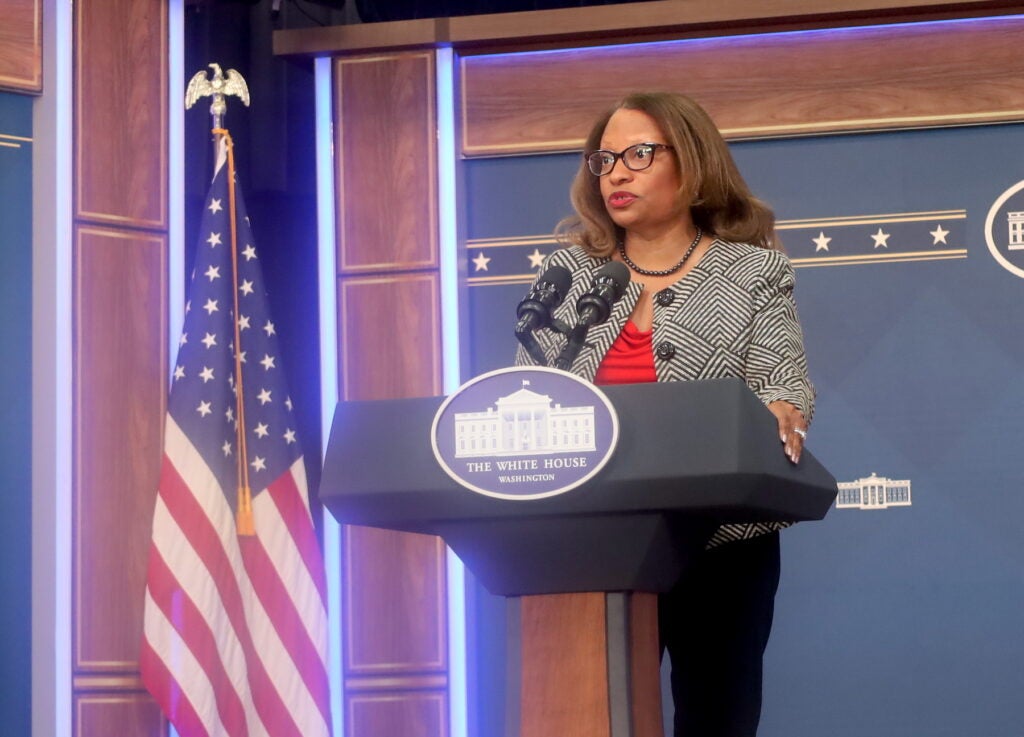
According to Pew Research, a total of 15,617 homes were sold last year, nearly 10,000 fewer than 2022, which was a banner year for home sales in Philadelphia.
“We helped 160,000 Black homeowners stay in their homes during the pandemic,” Todman said, adding that the administration is working to increase affordable housing to help renters, too.
The Pew Charitable Trust’s State of The City report shows among the nation’s 10 most populous cities, Philadelphia has the highest proportion of cost-burdened households with low incomes. The problem is particularly acute for renters with incomes below $30,000 per year; 88% are cost-burdened, with 68% severely cost-burdened, meaning they spend at least 50% of their income on housing.
The city’s supply of low-cost units is inadequate to meet the needs of such a large group of households — there are nearly twice as many low-income renter households as housing units they can afford.
“Our 2025 budget is recommending that we build two million additional homes across the country for renters and for homeowners. In addition to that, we want to make sure that we are providing, as I mentioned, rental assistance for all the low- and moderate-income folks,” said Todman.
Administration leaders said they are making changes to homeowner qualifications for HUD mortgage lending and HUD FHA mortgage lending to reduce mortgage fees.
They plan to re-evaluate HUD’s mortgage financing to lower costs for potential homeowners and have counselors across the nation canvassing neighborhoods to educate first-time homeowners about resources to restore credit and apply for programs to help purchase homes.
They also will host parties to help get more people involved and interested in learning more. “We literally had house parties with the DJ and the food and all the things and just introducing people to the process of purchasing a home,” said Todman.
When it comes to people building these homes, most of that work is done by white developers. Jim Burnett, with Philly’s Black Squirrel Collective, a company that provides funding to help Black and brown developers build properties in the city, reports that 95% of the developers in Philadelphia are white.
Todman said they are aware of those stats and are working to improve them.
“We’ve been gathering Black developers because one of the things that we know is as we are investing these billions of dollars that the president has been able to get for Americans, we want to make sure that some of these resources are going into Black communities and to Black businesses,” Todman said. “So we’ve been gathering Black developers across the country to teach them how to access HUD’s programs so they can be part of this business growth.”
HBCUs
The White House says it’s also prioritizing investments in Historically Black Colleges and Universities. When it comes to housing, Todman said support for HBCUs goes hand in hand.
“HUD does a lot of research about what happens in the housing space, and we want to make sure that the very unique perspective that comes with the impact on African Americans is being done by HBCUs. So we provided $15 million to HBCUs over the past couple years just to research what’s happening in the Black communities,” Todman said.
Dietra Trent, executive director of the White House Initiative on HBCUs, wants people to know the administration has provided funds to create new partnerships and programs with industries aimed at helping them to ensure schools are funded and remain open.
Some HBCUs feel they have been targeted over accreditation and few have faced scrutiny over mishandling of school funds.
Cheyney University in Cheyney, Pennsylvania, is currently in a fight over its accreditation after the Middle States Commission on Higher Education placed the nation’s first historically Black college on probation last fall.
“We believe the action is unprecedented and unjust,” said Cheyney University President Aaron Walton, who blasted the decision as unfair. “The direct move to probation from the Middle States Commission, bypassing the typical warning phase, is not only unusual but contradicts the overwhelming positive evaluations from two visiting teams in 2023.”
School leaders said they have made significant improvements over the past two years and find themselves fighting to protect the school’s reputation. They say it sends a bad message and are calling on a higher education commission to reconsider.
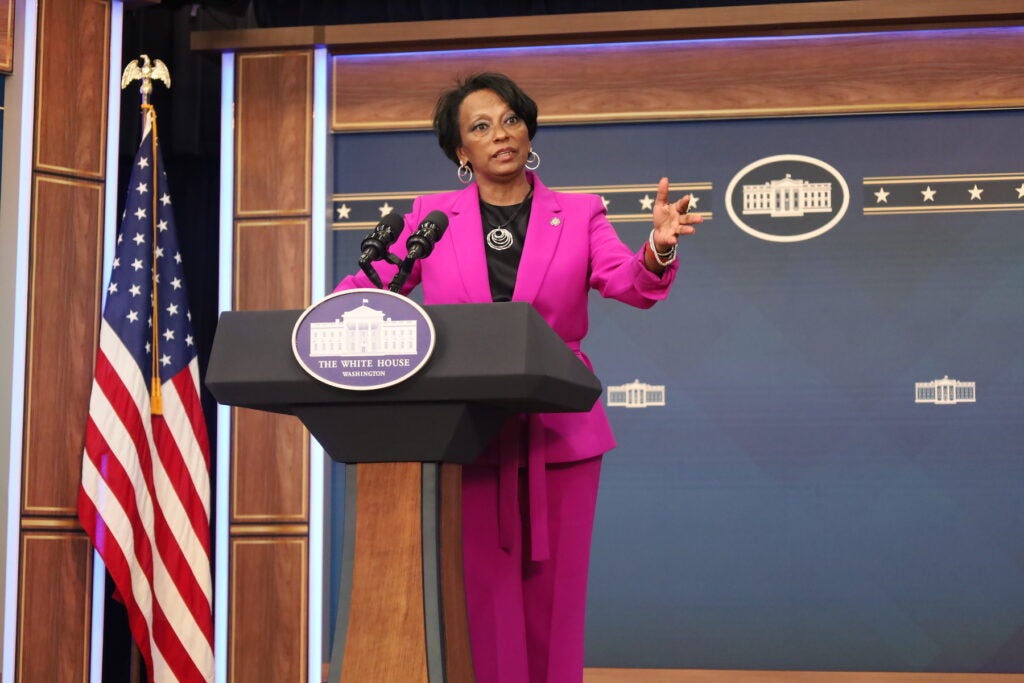
Trent said the White House is aware of what’s going on. “We in this department, in this administration, do everything we can to ensure that HBCUs have the support and the resources they need to overcome.” She said they recognize the historical barriers these schools have faced. ”Our schools have been denied support, denied opportunity, denied resources for 180 years. Cheney, 1837, established 30 years before the end of slavery. And for this length of time, we have not had the kind of resources, the kind of investments that we need in order to make the critical changes that we need. We don’t have the infrastructure in place.”
But that could change, as the White House claims it is rolling out a vast number of programs and investing millions to ensure schools are fully funded and have more resources under this administration.
“One of my favorite quotes that the president has often said is that an investment in HBCUs is an investment in our country and in our nation,” said Trent. She added that the administration invested $16 billion in HBCUs between 2021 and 2023. Some of the funds were from other agencies.
“Of the $16 billion, we are looking at $11 billion of that actually came from contracts and research and programs,” Trent said. She claims the funds will create partnerships that will allow students to participate in federal research programs.
“For the first time ever in the history of this country, an HBCU will lead a defense university affiliated research center with the Department of the Air Force … That’s a $90 million investment over five years. Howard is leading it. There are seven other HBCUs within that consortium that’s also doing research around tactical autonomy.”
Howard is located in Washington, D.C. and is the alma mater of Vice President Kamala Harris.
Prairie View University in Texas will also lead a university transportation center. Trent said 11 other HBCUs are among 34 schools that will receive a portion of $435 million to conduct transportation research.
The U.S. Department of Agriculture’s next-generation program will invest $262 million to train future agriculture professionals for HBCUs, land grant colleges, tribal colleges and Hispanic institutions.
The Department of Education invested $25 million to enhance research opportunities and infrastructure on their campuses.
The Department of Commerce has a pilot program called Connecting Minority Communities where 43 HBCUs received $134 million in grants to enhance broadband access on their campuses and in the surrounding communities. Eighty percent of HBCUs are in broadband deserts.
The office plans to continue investing in students at the more than 100 HBCUs across the nation. Trent said they believe it will provide an opportunity for more students of color to advance and have the resources to succeed.
Gun violence
The White House is also hoping to spread the word about the drop in gun violence around the U.S.
“Last year we saw 13.5% reduction in homicides, the steepest decline in American history, and just today, the FBI released their numbers for quarter one of this year, and we’re at 26% reduction in gun related homicides and homicides as a whole across the country and in major cities,” said Greg Jackson, deputy director of the White House Office of Gun Violence Prevention. “That includes a “43% reduction across major cities, including a 42% reduction in Philadelphia.”
There were 422 shootings in the city between January and May of this year, a steep decline from the 741 shootings during the same period last year. Incidents of gun violence peaked during the COVID health crisis, with Philly seeing 856 shootings in 2021 and 897 shootings in 2022.
The numbers suggest that the decline was at least partly the result of life returning to normal. However, the number of shootings this year is the lowest since 2015, well before the pandemic.
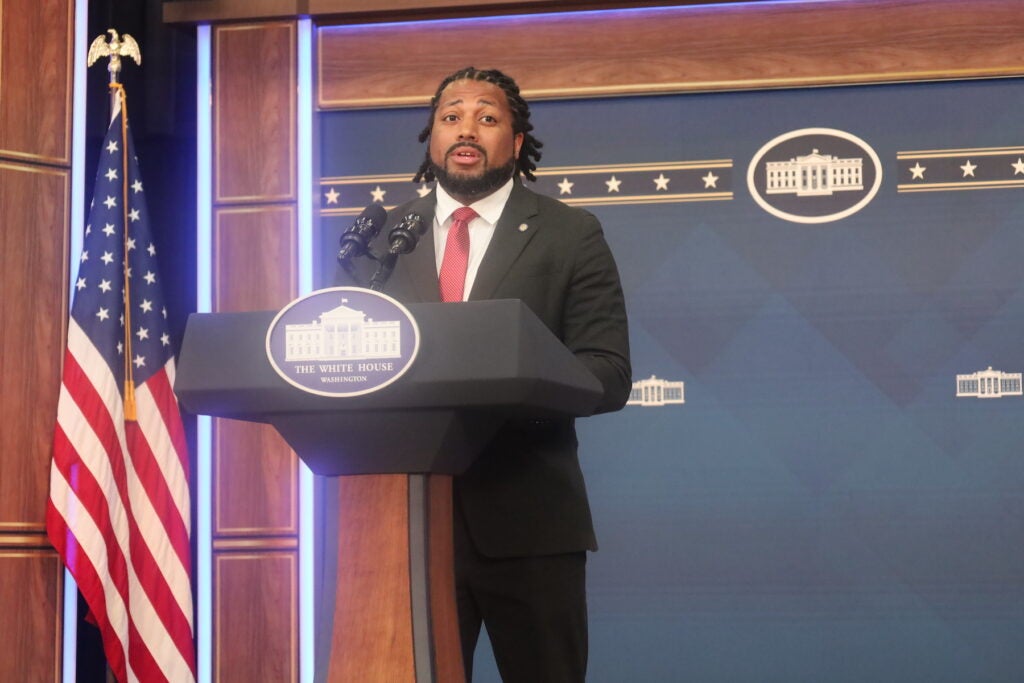
Jackson credits the administration’s multi-prong efforts to combat the epidemic through tackling gun trafficking and youth mental health issues. He said that the Bipartisan Safer Communities Act, which passed in 2022, provided $15 billion for community-led and law enforcement-based strategies to address the violence. This was in addition to $15 billion from the American Rescue Plan earmarked for violence reduction efforts.
“We invested, for the first time, in community violence intervention programs, community-led strategies that we know can intervene and work with those who are most at risk before a shooting happens, especially in Black and brown communities where interpersonal conflict really fuels a lot of the violence,” he said.
Those strategies included putting 14,000 school-based mental health professionals in public schools across the country.
As the first firearm regulation law in more than 20 years, the Bipartisan Safer Communities Act also “cracked down” on unlicensed gun sellers who are now held to the same standards as gun dealers and required to run background checks. The administration also made gun trafficking a federal offense and has already prosecuted 500 offenders.
Medicare/Medicaid
The administration says that more Black Americans now have access to free and low-cost health care. Expansions in Medicaid coverage means more people are covered, particularly among Black residents, and more than 1.7 million people overall have enrolled in federal and state health care exchanges, a 95% increase, according to Chiquita Brooks-LaSure, administrator for the Centers for Medicare and Medicaid Services at the Department of Health and Human Services.
Medicaid enrollment skyrocketed early on during the pandemic as people lost their jobs and, along with them, their employer-based health insurance. Pennsylvania had already expanded eligibility. Nearly 400,000 people signed up within the first year of the COVID crisis.
Since the end of the pandemic, Keystone State residents have been dropping off, with Medicaid rolls dropping by 500,000.
Brooks-LaSure said they found coverage numbers overall have stayed fairly constant, but people moved to different types of coverage, such as those who found jobs and received employer-sponsored insurance.
“But we continue to look to see what more needs to be done and we’ve put out new rules to states, telling them things that they need to do to continue to improve to make sure that we get people re-enrolled” if they still need coverage, she said. “Medicaid enrollment is rolling and if you’re still eligible you can come back in at any time.”
Medicaid can be a lifeline for people who become pregnant, as it covers more than 40% of births across the country, and 64% of Black births.
“CMS has helped nearly all states provide 12 months of continuous postpartum coverage through their Medicaid programs up from only 60 days,” Brooks-LaSure noted.
She also said older Pennsylvanians who rely on Medicare for health coverage are seeing pharmaceutical costs cut through caps on the prices for drugs they pay.
“This cap is truly life-changing for people who rely on high-cost medications such as life-saving treatments for heart disease, diabetes and other conditions,” Brooks-LaSure said.

Get daily updates from WHYY News!
WHYY is your source for fact-based, in-depth journalism and information. As a nonprofit organization, we rely on financial support from readers like you. Please give today.



